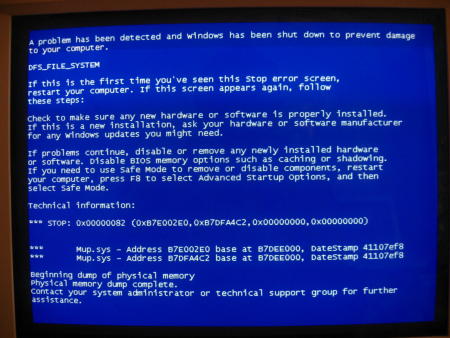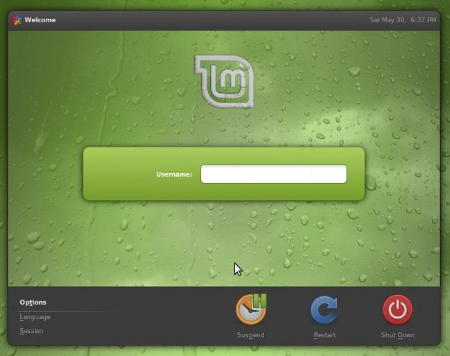
A few weeks ago, I got a network attached storage device (a D-Link DNS-323 if you want to know) and it works perfectly with Mac OS X and Linux. I must have transferred more than 500Gb to and fro up to now without any glitch.
Yesterday, I was feeling bored and I decided to boot into Windows XP (I have it on one computer and I have stopped using it) to see if the NAS works well with it. The initial connection went well but I got a Blue Screen of Death (pictured above) during transfer of data.
I rebooted the PC in Windows and tried again. Once more I got the BSOD.
I wonder what normal people do when they get a BSOD? Do they contact their system administrator or technical support group as advised? Or do they just reboot and pray that the problem will go away?
Personally, I only have to reboot the PC and, after a few seconds, something magical happens: the Linux login screen appears.

This is when I realise how lucky I am.



Ah…BSODs, I’ve seen so much that I don’t even mind them anymore. They’ve become part of my usual routine of using a computer, like waiting 15 minutes for the Windows login to appear, emptying the recycle bin or adding new torrents every day. :)
Windows is like continuous but non-life-threatening torture: after some time, you don’t even feel the pain. :P
Maybe for regular users…
But for someone who only boots into Windows once a month, I am amazed of how brittle it is compared to Mac OS X and Linux which I use on a daily basis :-)
That’s bizarre. I have never used a NAS pesonally, but one of colleagues has a D-Link NAS which he has been using with his Windows computer without BSOD. The only thing he complains about is how slow it is.
I use all of them. Although I like OS X a lot, I don’t like Apple’s approach of denying an existing problem until a huge number of people start complaining about the problem. Random Shutdown on first generation MacBooks is an obvious example. And Apple took quite a long time before patching the Java vulnerability.
We can say that Windows has a lot of flaws, but they do work on fixing them quite rapidly.
You’re right. Every OS provider (including us — OSS guys and girls) work hard to make things work as seamlessly as possible. The thing is, I wonder, giving the prevalence of BSODs, what users generally do when they have one? I think most people just reboot and pray. This is somewhat different in the Linux world where people are more inclined to read logs and try to troubleshoot.
I would like to add that not everything is better on the Linux and Apple side. On the Mac side, watching a YouTube video will make my MacBook’s fan go crazy. This does not happen on my wife’s Vista computer. On the Linux side, I’ll admit that Linux has made huge progress over the years. However, more progress still needs to be made. Open Office is not MS Office. The grammar check and spell check will not satisfy many “normal” users. And let’s face it, the interface is not the most beautiful either. Good looking interface is part of the whole computing experience. This is what OS X is praised for.
I’m not a fan boy of any platform, although at the beginning I was becoming an Apple one. I’m just saying things like I see them.
I’m not so sure about that. Besides those who have AppleCare, I don’t know many people who automatically call for support. I was thinking about this the other day. I have not heard a single person calling Microsoft for support, even in the corporate world. As for reading logs and troubleshooting, I’m not so sure here either. Most (if not all) normal users, tend to call friends for help more than anything else. “Computer people” tend to read logs, check the web for solutions, but “normal users” usually don’t. And I’m pretty sure those who use Linux are pretty computer literate in the first place. “Normal users” stick to the Windows version pre-installed on their computers or buy a Mac because it just works out of the box. How many “normal users” do you know who regularly backup their file? If most of them don’t, I’m pretty sure, they are not going to download an ISO file, burn it onto a CD and then install Linux on their computer. I’m talking from experience. I talk to “normal users” everyday :-)
Yeah. Normal users tend to stick with the Windows they got on their PC. Those who run Linux tend to be geeks and, therefore, really love to troubleshoot :-)
Yes, it’s fun at times to troubleshoot and see how things work fine after. But, even geeks tend to move to the other (bright or dark?) side sometimes. I try to find solutions which can be implemented via the GUI in Ubuntu as much as I can. My printer is shared via my Ubuntu box. I don’t want to have to walk my wife through using the Terminal if she calls me at work because she cannot print.
I know it’s pretty early in Mauritius, but it’s bedtime for me in Canada. Nice “chatting” with you about different point of views. I’m currently evaluating if I can live solely on Linux and will probably blog about it. I have my own personal reasons for this project plus I want to see if I can recommend Linux to a “normal user.”
The BSOD points towards a bad NAS driver – Mup.sys?
About BSODs, since I’ve been using Vista/7, I only get them when my graphics card goes loose. :(
Not that’s relevant or anything… but how (ab?)normal users might react to bsods: http://www.youtube.com/watch?v=FVbf9tOGwno
lmao
@Patrick: If I didn’t have a MacBook, I would have done everything using Linux (I use CentOS at work and Mint at home.) In fact, my parents, who don’t know much about computers, have been using Ubuntu exclusively for 1 year now and everything works great.
@Carrotmadman6: MUP.SYS is written by Microsoft… I didn’t have to install any driver for the DNS-323 as the transfer is done over SMB.
@vik: This is a bloody gorgeous video :-)
Ahh.. good old BSOD! They could have made it prettier in 7/Vista.. but its the same..
What to do.. Its there.. and its always gna be there…! Long Live Windows!! *scarcasm intent*
same thing @ my place :( after 1 month I’m bootinh win vista x64 which is installed on another HD and it gives me BSOD and restarts :s
I’m the system admin, how do I contact myselft ? :p
By the way, since you’re a former lecturer, do you understand those technical info like address in HEX and other blablas?
Yes, I understand hex. But I am not sure I understand Microsoft hex as I’m sure they use a non-standard variant of it :-)
For “normal users” like you said, a base installation of Ubuntu or CentOS will probably suffice. I’m pretty sure my mum will be happy with that too, especially since a virus attack is virtually non existent. She will be able to use Skype instead of MSN Messenger for videoconferencing.
But, for those who make a living writing, specially in French, then I think the default word processor–Writer– is pretty weak as far as spell check, grammar check and dictionaries are concerned. Moreover, for those who write a lot in French, “Le Nouveau Petit Robert” is a must. While the paper version is nice, the electronic version can save one a lot of precious time. Unfortunately, the electronic version works on OS X and Windows only. It’s sad, but that’s the way things are at the moment.
You’re right about Writer being somewhat lacking when writing in French. The dictionary is not bad (when it is installed of course which is not always the case) but the lack of grammatical correction in the default installation is problematic.
This thread (Correcteur d’orthographe et de grammaire) explains what needs to be done to make Writer good enough for people writing in French. In particular, it seems that everyone is raving about LanguageTool right now. It is a open source grammatical corrector for OpenOffice 3 (no luck for those running version 2…) and it seems to work really well (I’ve not yet testing it though.)
[PS: Here are the various dictionaries (including a French dictionary) which can be used with OpenOffice 3]